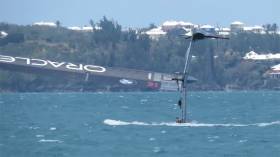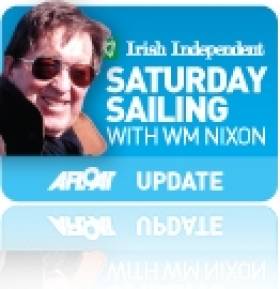Displaying items by tag: Team Oracle USa
#AmericasCup - Team Oracle USA have their work cut out for them after their second capsize in as many months during training for the America's Cup in Bermuda this week.
Sail-World has the full report on the latest incident, which occurred when the team’s AC50 catamaran went into a roll at high speed after a foiling gybe.
The team confirmed no injuries to the crew and only limited damage to the vessel in the capsize this past Wednesday 10 May.
But it can’t be good for morale among the defending Auld Mug holders, coming so soon after capsize trouble a month previously.
No other AC50 has capsized in preparation for the qualifiers later this month – including Land Rover BAR, which is skippered by Sir Ben Ainslie, the man who turned around Oracle’s fortunes for their shock victory in 2013.
America's Cup Deserves the Nobel Peace Prize
#americascup – The America's Cup is still sailing's sacred monster. More so than ever, in fact. And it is still something of which we can honestly say: "This is the peak of world sailing – alas". But after the fantastic 34th America's Cup series in San Francisco, there's no denying it has us hooked.
How can we be so sure? There's a simple test. Anyone who took the slightest interest in it now asks: "What happens next?" Once you're getting that response from people, whether they are sailors or sports fans or simply good old Joe Public who just happened to catch it on a news flash, then you've got them hooked, and you can build on that for the future of the event.
So from being something which was only the highly specialised interest of an elite minority, it has become a supercharged happening from which everyone can take something. My own conversion came not from contemplating the seemingly endless intrigues which surrounded the event, and not from its extraordinary history of larger-than-life characters and even more off-the-wall boats, but simply from watching the vids of the giant catamarans racing, just like anyone else in an increasingly rapt global audience.
It's amazing to think that in a couple of years time and probably much sooner, we will take it for granted that a machine like Oracle USA can be powered up to sail to windward at 32.5 knots. And that done in a true wind of 17 knots. It meant that those on board were experiencing an apparent wind of upwards of Force 10.
And as for the way these 72ft boats rose on their foils, we may have had glimpses of it in the preliminaries, but when it is happening as a regular occurrence you begin to feel you're not looking at a boat at all, but at an utterly sensational magic carpet. Sailing became three dimensional as they shook off the grip of the sea. One can only reflect that the great G L Watson, who was the first designer to become obsessed about the need to reduce wetted area, would have been ecstatic.
And all this technical stuff is over and above the basic human interest, and the allocating of credit where credit is due. For sure, the introduction of Ben Ainslie as tactician into Jimmy Spithill's Oracle USA team made a significant difference. But it's pitching it a bit high to say that Sir Ben saved the America's Cup for Larry Ellison. Rather, he was a major component in a complex process of continuous improvement in every area, in a campaign which cleverly utilised every opportunity for scrounging extra time in order to maximise the boat's performance and thereby upset Team New Zealand's seemingly unassailable points lead.
Thus any sailor with an under-performing boat can take encouragement from the fact that when the finals began, the Kiwi boat was simply out-performing Oracle. But in the nail-biting final race, after endless round-the-clock work on the American boat, the reverse was true. Tactically, it was the New Zealanders who were on top of the game to establish an early advantage in that final race. But once they were fully into the beat, Oracle simply sailed round them and on into a solid lead.
That it's suggested that this turnaround is something which can be an inspiration to any sailor may seem far-fetched when we consider just how remote the America's Cup catamarans are from the kinds of boats and the sort of sailing the rest of us enjoy. But that is the measure of this series – there was something in it for everyone.
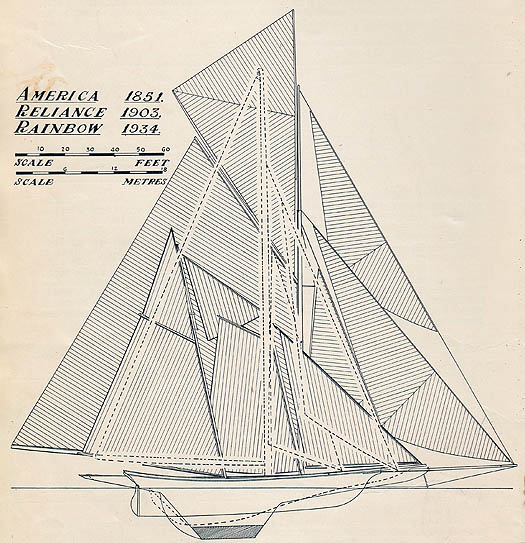
Three America's Cup winners, all to the same scale. Reliance of 1903 was the largest boat which has ever raced for the cup. At 143ft LOA, she was just one foot short of being twice the length of the current class of catamarans.
Not least of the impressions it leaves is the completely supra-national nature of it all. This genuine globalisation of sport is surely for the ultimate good of mankind. Officially it was New Zealand challenging America for an international trophy which originated in Britain 162 years ago. But what we might call the America's Cup community is now a supra-national grouping of hyper-talent drawn from many corners of the globe. Just which ensign goes up the winner's flagpole at the conclusion of the event depends on the nationality of whoever is signing the cheques. But the sailors themselves are patriots for their sport rather than the representatives of some narrow jingoist concept of nationality.
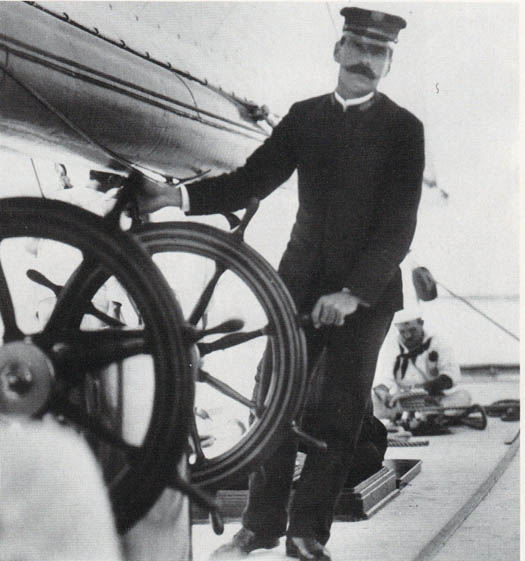
The main man. Charlie Barr on the helm of the giant Reliance, which had double wheels for extra power when needed. Barr was a Scotsman who became American as his sailing career reached the heights.
This is something which has long been central to the America's Cup, and it's all the better for it. After all, one of the greatest skippers in the history of the trophy was Charlie Barr, a Scotsman who settled in America after he had delivered a Clyde-built yacht across the Atlantic, and reached his full potential sailing American defenders of the cup.
More recently the Swiss involvement in the series emphasised just how meaningless traditional concepts of nationality can be. That said, we still do need some notion of nationhood in order to give us a better understanding of the human condition. The America's Cup's ability to transcend national feeling, while at the same time feeding a sense of national pride, is a remarkable achievement. It may seem a crazy idea, but why not consider it for the Nobel Peace Prize?
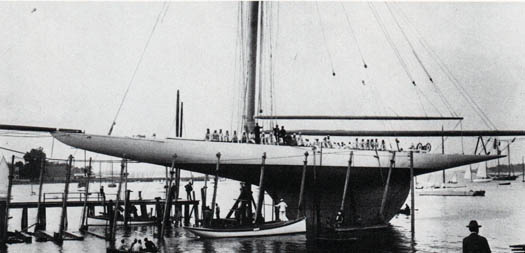
Launching day for Reliance, which carried a racing crew of 60......
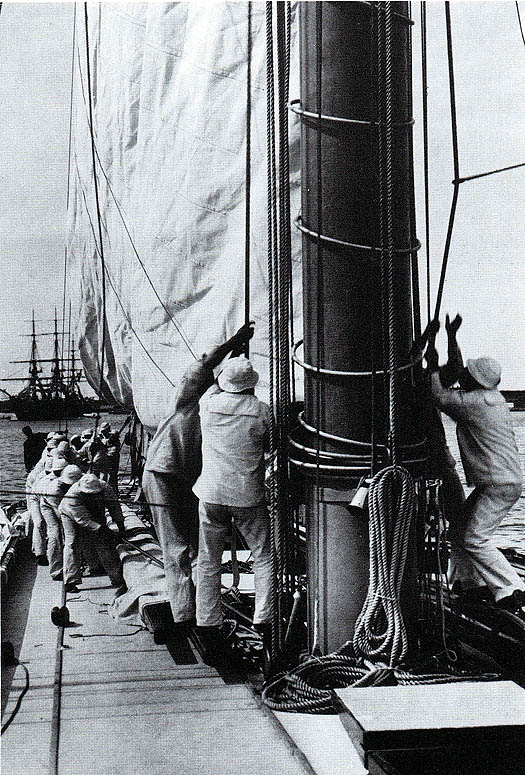
....and even with them all at work, hoisting Reliance's mainsail took quite some time. After defeating Thomas Lipton's Shamrock III by 3-0 in 1903, the Cornelius Vanderbilt-owned Reliance was dismantled, as her hull was built in so many different metals that it is said she hissed when put afloat.
As for its place in the global sailing community, it is currently very secure. We can't be certain that some future series will not draw the cup and our sport back into discredit, but for now we can be confident that the America' Cup has fulfilled all the hype, and then some. And by being something which is at a stratospheric height by comparison with almost all other forms of sailing, it now has the odd effect of making ordinary sailors feel more in community with the rest of the world. We reckon the America's Cup is just as crazy as everyone else does. But it certainly has got us hooked.



























